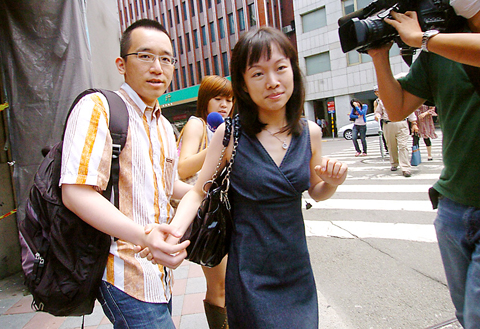Former president Chen Shui-bian’s (陳水扁) court-appointed lawyer tried to visit Chen at Taipei Detention Center yesterday, but Chen refused to see him, saying he did so to protest the conduct of his trial.
The former president’s new lawyer, Tseng Te-rong (曾德榮), received a note stating that Chen refused to see him when he requested to see Chen at the detention center yesterday afternoon.
Tseng said that in the note, Chen thanked him for coming to the center, but refused to see him because he had dismissed all lawyers to demonstrate dissatisfaction with an unfair judicial system, not because he did not have the money to hire lawyers.

PHOTO: LO PERI-DER, TAIPEI TIMES
“[Chen] told me not to waste my time trying to visit him again,” Tseng said.
Tseng said whether or not he would again try to visit the detained former president depended on how the case plays out.
He said he felt “very stressed” about the case because the whole country was paying attention, but added that it was his job to do his best to defend Chen.
When asked about the boxes of case documents he needs to read, he said: “I will have to put in lots of overtime.”
Even if Chen refuses to discuss the case with Tseng, the lawyer said he would still gather evidence that could be used to build a solid case to defend the former president.
Although Chen has said he will not call any more witnesses, Tseng said he would request that the court call witnesses to help Chen’s case.
On Thursday, the former president declared in court that he would dismiss his attorneys and call no more witnesses because he wanted to protest the “illegal indictment, illegal detention and illegal trials.”
APPOINTED
Presiding Judge Tsai Shou-hsun (蔡守訓) appointed Tseng, the public defender assigned to Tsai’s court, to represent the former president.
Chen was indicted on Dec. 13 on charges of embezzling government funds, money laundering and forgery, along with 13 co-defendants, including his wife. He has been detained at Taipei Detention Center since Dec. 30. He denies the allegations and calls the trials a form of political persecution, however, he has conceded that money was sent overseas, which he said was leftover campaign contributions.
CHEN CHIH-CHUNG
Meanwhile, prosecutors yesterday questioned Chen’s son, Chen Chih-chung (陳致中), and wife Huang Jui-ching (黃睿靚) about the couple’s overseas bank accounts.
The couple came out of the Special Investigation Panel’s (SIP) office at about 11:30am.
TV footage showed Chen Chih-chung starting to tell reporters about the questioning, but his wife quickly silenced him by patting his hand.
The couple had promised to wire NT$570 million (US$16.8 million) from Swiss bank accounts back to Taiwan so they could enter plea bargaining with prosecutors.
However, despite letters that Chen Chih-chung sent to the Swiss banks requesting the money be wired back to Taiwan, the transfer has not been completed.
Chen Chih-chung and his wife were indicted in December for money laundering in connection with allegations against the former president.

Civil society groups yesterday protested outside the Legislative Yuan, decrying Chinese Nationalist Party (KMT) efforts to pass three major bills that they said would seriously harm Taiwan’s democracy, and called to oust KMT caucus whip Fu Kun-chi (傅?萁). It was the second night of the three-day “Bluebird wintertime action” protests in Taipei, with organizers announcing that 8,000 people attended. Organized by Taiwan Citizen Front, the Economic Democracy Union (EDU) and a coalition of civil groups, about 6,000 people began a demonstration in front of KMT party headquarters in Taipei on Wednesday, organizers said. For the third day, the organizers asked people to assemble

POOR IMPLEMENTATION: Teachers welcomed the suspension, saying that the scheme disrupted school schedules, quality of learning and the milk market A policy to offer free milk to all school-age children nationwide is to be suspended next year due to multiple problems arising from implementation of the policy, the Executive Yuan announced yesterday. The policy was designed to increase the calcium intake of school-age children in Taiwan by drinking milk, as more than 80 percent drink less than 240ml per day. The recommended amount is 480ml. It was also implemented to help Taiwanese dairy farmers counter competition from fresh milk produced in New Zealand, which is to be imported to Taiwan tariff-free next year when the Agreement Between New Zealand and

A woman who allegedly spiked the food and drinks of an Australian man with rat poison, leaving him in intensive care, has been charged with attempted murder, the Taipei District Prosecutors’ Office said yesterday. The woman, identified by her surname Yang (楊), is accused of repeatedly poisoning Alex Shorey over the course of several months last year to prevent the Australian man from leaving Taiwan, prosecutors said in a statement. Shorey was evacuated back to Australia on May 3 last year after being admitted to intensive care in Taiwan. According to prosecutors, Yang put bromadiolone, a rodenticide that prevents blood from

China is likely to focus on its economy over the next four years and not set a timetable for attempting to annex Taiwan, a researcher at Beijing’s Tsinghua University wrote in an article published in Foreign Affairs magazine on Friday. In the article titled “Why China isn’t scared of Trump: US-Chinese tensions may rise, but his isolationism will help Beijing,” Chinese international studies researcher Yan Xuetong (閻學通) wrote that the US and China are unlikely to go to war over Taiwan in the next four years under US president-elect Donald Trump. While economic and military tensions between the US and China would